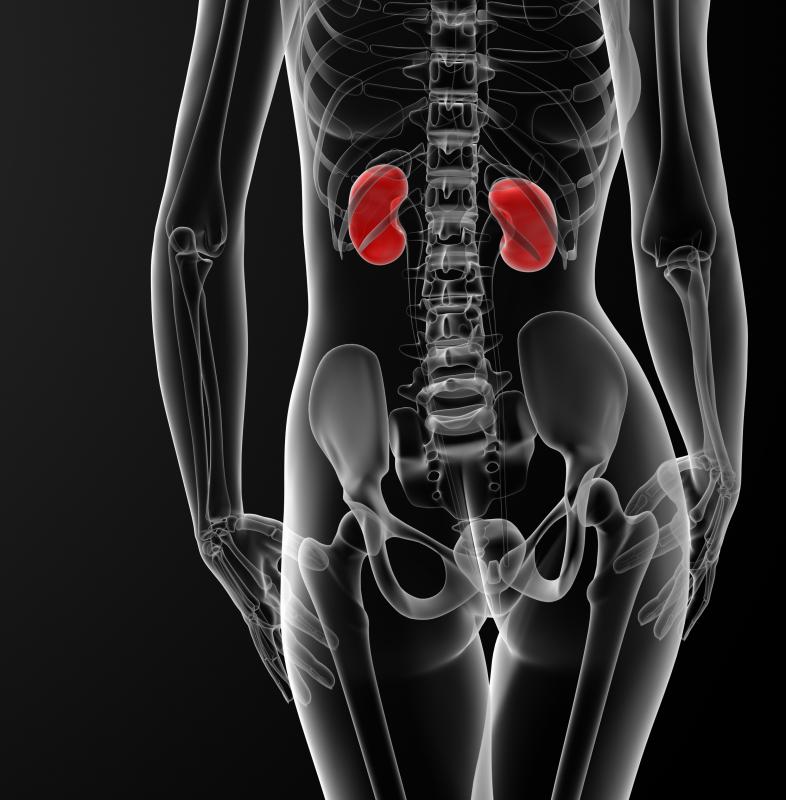At TheHealthBoard, we're committed to delivering accurate, trustworthy information. Our expert-authored content is rigorously fact-checked and sourced from credible authorities. Discover how we uphold the highest standards in providing you with reliable knowledge.
What is Hepatic Metabolism?
Hepatic metabolism is the array of chemical reactions that occur within an organism's liver. It is part of the biochemistry of all vertebrate species, including humans, and is essential to their survival. The liver is the site of many vital metabolic processes, including protein synthesis, detoxification, and the production of digestive chemicals. Hepatic metabolism is the source of many substances essential to continued health and survival.
The liver is important to the metabolization of carbohydrates. A process called glycogenesis metabolizes the common sugar glucose and converts it into glycogen, which is stored as a compact energy reserve. When that energy is needed quickly due to increased physical exertion or low blood sugar, the liver converts the glycogen back into glucose in a process called glycogenolysis. Another metabolic pathway, gluconeogenesis, allows the liver to synthesize glucose from other substances such as lactic acid and glucogenic amino acids such as glycine and alanine.

Hepatic metabolism is also vital to the body's processing of fats and other lipids. Metabolic processes in the liver convert excess carbohydrates and proteins into chemicals called triglycerides, the primary form in which animals store fat. When the body needs energy, the liver breaks triglycerides down into free fatty acids that are released into the bloodstream, where they can be picked up and used as an energy source by other tissues.

The liver synthesizes cholesterol to supplement dietary cholesterol and produces lipoproteins that transport cholesterol through the bloodstream. It also metabolizes cholesterol to produce bile acids, which are used to digest fats in the intestinal tract and remove metabolic byproducts from the liver. Cholesterol is essential to the healthy formation and maintenance of cellular membranes.

Hepatic metabolism also produces some amino acids and proteins. It is particularly important as the body's main source of blood plasma proteins such as serum albumin, soluble plasma fibronectin, and several types of globulin. The liver also produces most of the enzymes involved in the coagulation cascade, the process that causes blood clots to stop bleeding, as well as the inhibitor proteins. Many carrier proteins are also produced by the liver, including ceruloplasmin, transcortin, and haptoglobin.

Hepatic metabolism is essential to protecting the body from substances from outside the body, called xenobiotics. The liver is the most important location for the metabolic pathways that neutralize and remove chemicals foreign to an organism's healthy biochemistry, such as poisons. The liver's position at the front lines whenever a hazardous substance is ingested makes it vulnerable to damage if it is repeatedly overtaxed, which is why cirrhosis of the liver is a common effect of alcoholism.

Most metabolization of drugs also occurs in the liver. Medications swallowed by the patient must go through the liver before reaching the bloodstream. In some cases, hepatic drug metabolism in the patient may prevent sufficient quantities of the drug from entering the bloodstream, a phenomenon called the first-pass effect. Some drugs are administered by other means, such as inhalation or injection, to avoid this effect.

Many metabolic pathways that are part of hepatic metabolism are not exclusive to it and are also carried out elsewhere in the body. However, the cells of the liver, called phagocytes, are specialized for this function. The liver is thus the single most important site for these processes, and total loss of liver function will kill the organism.
Many health problems can result if normal hepatic metabolism is disrupted. Due to the liver's importance to the production of blood proteins, people with liver damage can suffer from increased bleeding and bruising, shortness of breath due to reduced oxygen levels in the blood, and potentially lethal renal failure caused by lack of blood to the kidneys. The body's impaired ability to process and excrete chemicals can allow potentially dangerous substances, such as ammonia, bilirubin, and various metals, to build up to toxic levels, causing health problems such as jaundice and encephalopathy.
AS FEATURED ON:
AS FEATURED ON:



















Discussion Comments
The liver is vital to so many functions of the body that it seems wise to support it nutritionally. What foods and supplements support liver health?
Post your comments